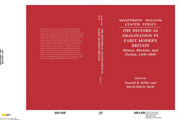Book contents
- Frontmatter
- Contents
- Preface
- WOODROW WILSON CENTER SERIES
- 1 Introduction
- 2 Precept, example, and truth: Degory Wheare and the ars historica
- 3 Truth, lies, and fiction in sixteenth-century Protestant historiography
- 4 Thomas More and the English Renaissance: History and fiction in Utopia
- 5 Little Crosby and the horizons of early modern historical culture
- 6 Murder in Faversham: Holinshed's impertinent history
- 7 Foul, his wife, the mayor, and Foul's mare: The power of anecdote in Tudor historiography
- 8 Experience, truth, and natural history in early English gardening books
- 9 Thomas Hobbes's Machiavellian moments
- 10 The background of Hobbes's Behemoth
- 11 Leviathan, mythic history, and national historiography
- 12 Protesting fiction, constructing history
- 13 Adam Smith and the history of private life: Social and sentimental narratives in eighteenth-century historiography
- 14 Contemplative heroes and Gibbon's historical imagination
- Contributors
- Index
- Titles in the series
8 - Experience, truth, and natural history in early English gardening books
Published online by Cambridge University Press: 04 August 2010
- Frontmatter
- Contents
- Preface
- WOODROW WILSON CENTER SERIES
- 1 Introduction
- 2 Precept, example, and truth: Degory Wheare and the ars historica
- 3 Truth, lies, and fiction in sixteenth-century Protestant historiography
- 4 Thomas More and the English Renaissance: History and fiction in Utopia
- 5 Little Crosby and the horizons of early modern historical culture
- 6 Murder in Faversham: Holinshed's impertinent history
- 7 Foul, his wife, the mayor, and Foul's mare: The power of anecdote in Tudor historiography
- 8 Experience, truth, and natural history in early English gardening books
- 9 Thomas Hobbes's Machiavellian moments
- 10 The background of Hobbes's Behemoth
- 11 Leviathan, mythic history, and national historiography
- 12 Protesting fiction, constructing history
- 13 Adam Smith and the history of private life: Social and sentimental narratives in eighteenth-century historiography
- 14 Contemplative heroes and Gibbon's historical imagination
- Contributors
- Index
- Titles in the series
Summary
For I consider history and experience to be the same thing, as also philosophy and the sciences … History is either Natural or Civil. Natural History treats of the deeds and works of nature; Civil History of those of men.
– Francis Bacon, The Advancement of LearningIn the twentieth century, natural history is understandable as history when it narrates the slow change of species over the millennia. In the early modern period, however, a history of nature meant something different: the story of nature's “deeds and works” seen through the human experience of them. As such, early modern natural history may have been atemporal in form, describing in the moment of writing natural phenomena as people knew them. Yet the writers of those histories understood that people had written differently of nature in past times and separate places. By the seventeenth century, natural historians were asking the same questions that the recorders of civil history posed: What constituted evidence of “historical” truth? Whom should one believe? Was it possible to write a universal history, or did history reside, like truth, only in the particulars?
When Francis Bacon linked history with experience in his Advancement of Learning, he cut to the heart of this debate over truth, imagination, and authority in the writing of natural as well as civil history in England. Bacon himself narrowed the field of authorities on natural history by cutting off both Greek philosophy (for “at that period there was but a narrow and meagre knowledge either of time or place,”) and folk wisdom about the natural world. In The Great Instauration Bacon claimed to be more troubled with them.
- Type
- Chapter
- Information
- The Historical Imagination in Early Modern BritainHistory, Rhetoric, and Fiction, 1500–1800, pp. 179 - 209Publisher: Cambridge University PressPrint publication year: 1997
- 1
- Cited by

